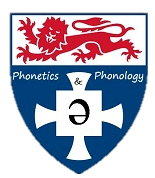Our group brings together researchers interested in all aspects of speech production, perception and learning. We cover a varied range of expertise and interests, including experimental phonetics (acoustic and articulatory phonetics), theoretical phonology, laboratory phonology, speech processing, sociolinguistics, language variation and change, and first and second language acquisition.
Theoretical and Laboratory Phonology
Our research covers:
- Bilingual and second language phonology
- Prosody
- Psycholinguistics
- Speech timing
- Speech production and perception
We research the acquisition of phonetics and phonology by monolingual and bilingual children. We put particular emphasis on the influence of the social context in which acquisition takes place.
We have also explored second language acquisition of various phonetic and phonological features. In addition to English, we also study a range of languages, including Arabic, Dutch, French, German, Italian, Mandarin, etc…
Furthermore, we research the influence of orthography on second language phonological representation. This is an understudied area of research that has recently attracted a lot of attention.
We also use state-of-the-art techniques to investigate representations of rhythm, intonation and emotion in the brain.
We investigate how segmental and suprasegmental variation affects listeners’ processing and understanding of spoken utterances, including the problem of word segmentation: that is, the extraction of individual words form the continuous flow of speech.
Acoustic and Articulatory Phonetics
Our members have been addressing major gaps in the phonetics of various Arabic, English and French dialects. They use instrumental and articulatory techniques. We have covered areas which include:
- Glottalisation
- Gemination
- Nasalisation
- Pharyngeal and guttural realisation and representation
- Static and dynamic aspects of vowel production
- Voicing/laryngeal contrasts
Speech Processing
Our members have interest in the areas which include:
- Stuttering as a developmental speech disorder and its relationship to fluent development of speech and language
- Speech processing of listeners with tinnitus
- The relationship between Tourette’s syndrome and language development
- Personalised dysarthria intervention for children with cerebral palsy
A variety of methodologies are used to study these processes including:
- Analyses of naturally-produced spontaneous speech
- Surveys
- Experimental studies
- Neuroimaging studies
- Modelling studies
Sociolinguistics and Language Variation and Change
Our research areas include:
- Dialectology
- Sociophonetics
- Language place and identity
- Sociolinguistic factors
They influence variation in speech and people’s perception of it. We have looked at dialectal variation in various dialects of Arabic, English, French, Mandarin and so on.
We also look at the acquisition of socio-phonetic variation, and the perception of L1 and L2 accents and dialects.
First and Second Language Acquisition
We have expertise in English and other international languages, general linguistics, child language acquisition, second language acquisition, language in education, language and identity, and English for academic purposes.
Our areas of interest include:
- Child language acquisition
- Second language acquisition
- Monolingualism
- Bilingualism
- Multilingualism
- International languages
- Immigrants and social identity
- Phonology in second language acquisition.
Our methodology includes:
- Analyses of naturally-produced spontaneous speech
- Corpus analyses
- Experimental studies
- Neuroimaging studies (e.g. EEG imaging)
- Modelling studies

